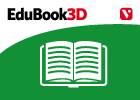Cargando...
Recursos educativos
-
Nivel educativo
-
Competencias
-
Tipología
-
Idioma
-
Tipo de medio
-
Tipo de actividad
-
Destinatarios
-
Tipo de audiencia
-
Creador
Lo más buscado
- Actividades poesía
- La batalla del Ebro
- Experimentos para expociencia
- Relieve de Australia
- Divisiones para practicar
- O aberta O tancada
- Animales selvajes
- Biosfera
- restas para niños
- Descargar ejercicios de ingles
- webquest
- Matemáticas divertidas
- Simetría axial
- imágenes matemáticas
- Ilustraciones del ciclo del agua
-

Summary - Understanding the text
EduBook Organización
- 2265 visitas
Read these sentences and match them to a picture.Rewrite these sentences in the past tense, as in the example. There is an example at the beginning. Sir Brangwyn wants Rhiannon to help him find the…
-

Rocks and soil on the Earth's surface
EduBook Organización
- 2089 visitas
Types of rocks The Earth's crust is made up of three types of rock: igneous, sedimentary and metamorphic. Igneous rocks are formed when magma (a rock in a liquid state) cools. If the magma reaches…
-

Learn. Calculating distances on maps
EduBook Organización
- 1740 visitas
The scale of a map indicates how much the area that is represented has been reduced. The numerical scale is a fraction: the larger the denominator, the greater the reduction. These maps are called…
-

Must - Understanding the text
EduBook Organización
- 1684 visitas
'YOU MUST GIVE IT TO ME!' We use must when something is important or necessary. Example: Mowgli must learn the Law of the Jungle. We sometimes use you + must to tell someone to do something. You…
-

Grammar - Go back to the text
EduBook Organización
- 1532 visitas
Countable and Uncountable Nouns Some nouns in English are countable. They have a singular and plural form. For example: an island → islands (noun + -s regular plural) a man → men (irregular plural)…
-

Grammar (I)
EduBook Organización
- 1510 visitas
Future with will We often use will + verb when we make a sudden decision to do something in the future. For example: Jim: I’m going to the inn. Tom: Good. I’ll come with you. We also use will + verb…
-

Present continuous
EduBook Organización
- 1322 visitas
'WE'RE FOLLOWING THE MONKEY PEOPLE' We use the present continuous to describe something that is happening at the moment we speak. To form the present continuous we use to be + a verb +…
-

Your trip around the world
EduBook Organización
- 1296 visitas
Phileas Fogg gives the crew some money but he probably had to ‘bargain’ first. ‘To bargain’ means you must agree on the price you want to pay for the object with the seller. Choose the correct…
-

Pirates, Wreckers and Buccaneers
EduBook Organización
- 1057 visitas
You can use the Internet to discover more interesting information about pirates, wreckers and buccaneers. Use a search engine, for example Google or Yahoo. Type in pirates. Look at the results which you…
-

Listening - Understanding the text
EduBook Organización
- 1036 visitas
'I'M GOING TO SAY THE WORDS TO BAGHEERA' We use going to when we have a definite plan to do something in the future. We use the verb to be + going to + verb (e.g. watch). Example: We’re…
Te estamos redirigiendo a la ficha del libro...





